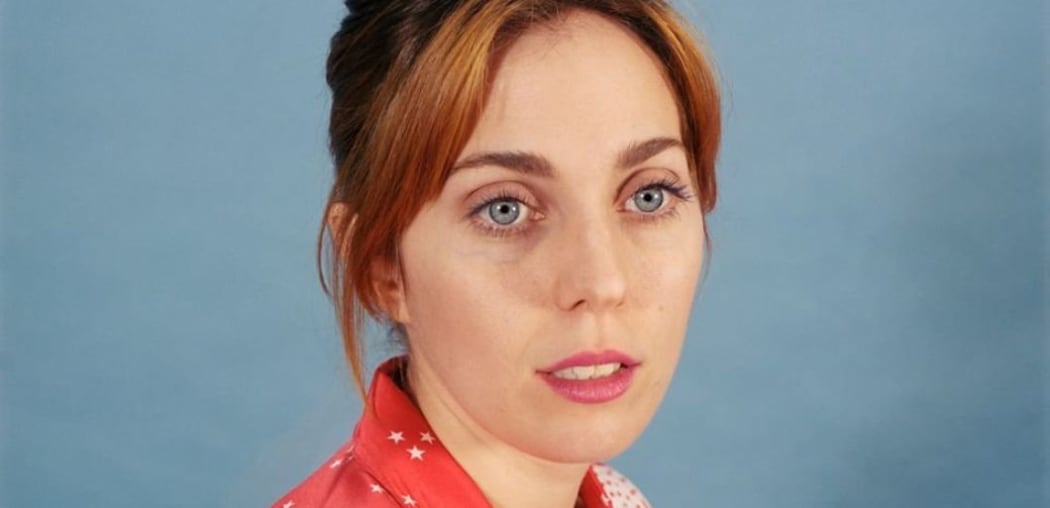
Meghan Remy AKA U.S. Girls Photo: supplied
Meghan Remy has been making music as U.S. Girls for the past decade, specialising in lo-fi pop tunes that rage against the patriarchy, politicians, and society in general. Her latest album In A Poem Unlimited is her first polished studio recording, but it retains her lyrical fury.
Meghan Remy is unprepared for the barrage of compliments I fire down the phone line.
It’s a little excessive maybe, but U.S. Girls’ In A Poem Unlimited is worth getting enthused about, a collection of instant alt-pop classics.
Critics agree, with the album currently sitting at 86% on aggregate site metacritic.com. When I tell her it’s my favourite of the year so far, Meghan is characteristically nonchalant: “Well, it’s only February…”
For the album she worked with twenty collaborators, creating songs that evoke classic pop from decades past, while keeping the lyrical venom that’s become her trademark.
Writing each song from a different character's perspective, topics covered include domestic abuse (Incidental Boogie), women taking up arms again their male oppressors (Velvet 4 Sale), and disappointment with Barack Obama’s presidency (M.A.H).
That last one (an acronym of Mad As Hell), points out the discrepancy between Obama’s pacifist rhetoric and his use of combat drones (“the coward’s weapon of choice”).
I ask how close she is to the character in M.A.H. She responds bluntly “I don’t like politicians. I don’t trust any of them.
“Just the symbol of having a person of colour in The White House [was important]. No matter what he did you can’t take that away, the strength of that symbol.
“But I couldn’t get swept away by it. The person in that song did get swept away by it though, and then was disappointed.”
In conversation she couldn’t be less venomous. Warm and personable, she peppers our conversation with laughter.
It feels like a different Meghan than the one on the cover of In A Poem Unlimited, where she’s pictured crying, an image she described as someone “frozen in mourning”.
When I ask what’s being mourned, she giggles, and then hits me with “I’m mourning the path that humans have decided to take on this planet”.
It’s a neat summation of U.S. Girls. A serious point wrapped in something sweet.
The sweetness has increased throughout her career, at least in terms of fidelity. It follows that she gets called ‘subversive’ more often now. When I mention the word, Meghan coos sarcastically, and then admits “I think that’s accurate.
“Not only is it fun to be subversive, it’s very interesting artistically.
You can enjoy it even if you’re not understanding the subversive element of it. Which is what we tried to do on this album. If people don’t want to do the work and go into the lyrics, at least they can still dance.”
And the reason behind writing 'in character'?
“I think the characters are a way to protect my privacy, while doing something very public.”
It makes the name of the project appropriate in hindsight: Meghan plays various ‘U.S. Girls’ on her albums, (despite now living in Canada).
The real reason behind the name is far less cerebral: it was a nickname a former boyfriend gave her breasts.
Again that serious/ silly dichotomy.
Meghan has been notoriously studio-phobic in the past, happy to create music in solitude. I ask how she adjusted to working with a full band. “It’s like when the pool’s cold and you don’t want to get in. You’ve just got to jump.
“I was with people who knew I hadn’t really worked in a studio. There was not really a boss, so everyone got to contribute, and discuss things, and bring their skillset to the table.
“I would explain the song to the band; explain what was going on lyrically and maybe a vibe. But a lot of my job was getting people coffee, getting them water, making sure people took breaks…”
I suggest it sounds like a movie set where she’s overseeing everything.
“That’s how I feel. Like a director or producer, or a curator. I’m good at organising. And I’m good at finding the people that have the skillsets that I need.
“I collect people and keep them filed in different ways. Like, ‘that guy is a crazy conga player. And I’m going to file him here and call him up when I need that.’”
Our conversation turns to the Me Too movement. As someone whose music has focused on gender politics, is she positive about the current climate?
“Yes, there are interesting conversations happening. That’s only good; I’m happy about that, and I want to stay positive about it.
“But if we learned anything from the 60’s, it’s that anything that could cause change, or is pointing towards a larger power structure that’s controlling us, the powers that be are going to take that, turn it around and sell it to you.
“I think that’s happening now, a bit. You know, there’s a lot of merchandise going around online.
“There are t-shirts with boobs on them, and ‘the future is female’. I love t-shirts too, but I think it’s missing the point.
“But at least the conversations are being had. Ten years ago when I started this project we were still living in a time when people thought it was ‘post-racist’, and ‘post-sexist’.
“We’ve woken up and people are now like ‘OK, we're not 'post' anything'.
“We’re still in the thick of it.”

